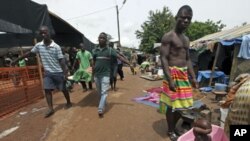Violence continues to plague civilians along Ivory Coast's volatile southwestern border with Liberia.
A dispute over who won Ivory Coast's presidential poll plunged the country back into civil war earlier this year. Rights groups say that in all, the post-election crisis killed approximately 3,000 people and displaced at least 500,000 more.
Security has since improved in much of the country, but the far southwestern corner along the Liberian border remains a persistent pocket of insecurity.
Human Rights Watch says since July, armed men loyal to ex-president Laurent Gbagbo have waged two deadly attacks on villages in the Tai region. Twenty three people were killed in the most recent reported raid on September 15.
HRW Ivory Coast researcher, Matt Wells, visited the area earlier this month and documented a similar attack in July that killed eight people.
"The impetus of the attacks seems both a desire to continue vengeance from the six-month conflict that has just ended, as well as to settle old scores on land rights that have long fueled tension in the far west of the country," said Wells.
The post-election conflict aggravated existing tensions over ethnicity and land rights in western Ivory Coast.
Wells said victims of the July raid told him they recognized their attackers. He said former Gbagbo militia who fled to Liberia are crossing the border and targeting perceived supporters of current President Alassane Ouattara, often West African immigrants and natives of northern Ivory Coast.
"It is just a 15-minute walk from Liberia to many of these villages. They come at night. They attack families, including women and children that are in the villages, killing and then they go back across to Liberia. The border is extremely porous. It is very difficult to control movement, very dense vegetation," said Wells.
Doctors Without Borders' Ivory Coast director, Tara Newell, said the group's emergency medical teams often are first on the scene of attacks, including the September 15 raid. Many of the wounded, she said, had fled into the bush when the team arrived.
"We did treat a lot of smaller wounds, including a lot of burn wounds, because the attackers in fact burned down a lot of the village while people were still in their homes, but unfortunately a lot of what we found were in fact the dead when we arrived," said Newell.
She said Doctors Without Borders found evidence of what she called "very deliberate acts of violence" against civilians.
"Anywhere from three-year-olds with close range gunshot wounds to the heads to pregnant women who have their stomachs slashed open, to males also. No civilian is safe, and that is what makes these attacks so horrible," said Newell.
She said the July and September attacks are actually part of ongoing violence that has gone largely unreported in the southwest.
Doctors Without Borders, she said, has treated more than 60 individual machete wounds and more than 30 gunshot wounds there in the past two months, as well as victims of kidnapping, torture and sexual violence.
She said endemic malaria, a recent measles outbreak and a nationwide medicine shortage further complicate the situation. Violence, she said, has displaced many people, which makes it harder for them to get medical attention.
"They are displaced in the bush somewhere and fear keeps them there and prevents them from coming out. We have set up our clinics in the areas where we think there is the most number of displaced," said Newell. "The problem is that the military has a very large number of checkpoints along the main access points, in fact more than anywhere else in the country. They charge a taxation level that most people can't afford."
HRW's Wells said following the July attack, the U.N. Mission in Ivory Coast sent additional troops to reinforce security in the region, but that the secondary, dirt roads remain dangerous.
"I had people saying that they were still unable to access their cocoa, coffee and rubber tree plantations because getting out of the main road is still considered just way too unsafe," he said.
Helicopters, Wells said, have been successful in deterring militia activity throughout the country. Human Rights Watch is calling on the U.N. mission to obtain authorization to use helicopters at night and do cross-border missions to further secure the Tai region.
Both the U.N. and the Ivorian government said they will deploy additional troops to the region following the September 15 raid.












